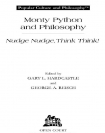Monty Python and Philosophy, Gary Hardcastle [portable ebook reader TXT] 📗

- Author: Gary Hardcastle
Book online «Monty Python and Philosophy, Gary Hardcastle [portable ebook reader TXT] 📗». Author Gary Hardcastle
Nietzsche too warned of the negative effects of most (if not all) social institutions, traditions, and customs, on the development and freedom of the individual. With respect to morality, he argued:
The free human being is [judged] immoral because in all things he is determined to depend upon himself and not upon a [moral] tradition. . . . [I]f an action is performed not because tradition commands it but for other motives (because of its usefulness to the individual, for example), even indeed for precisely the motives which once founded the tradition, it is called immoral and it is felt to be so by him who performed it.77
Nietzsche’s analysis of moral traditions even helps to explain why Monty Python’s Life of Brian aroused so much anger among certain religious groups, Christians especially. At some point in the development of the traditions of many religious societies, it became unacceptable to philosophically investigate (or make a comedy about) religion—even though one of Jesus’s main goals was to get people to re-think their religious commitments and values.
Moreover, the Pythons have repeatedly claimed that they were not poking fun at Jesus in Monty Python’s Life of Brian, but rather at the social movements that were, and still are, formed to interpret Jesus’s teachings. As Terry Jones put it later:
[Monty Python’s Life of Brian is] very critical of the Church, and I think that’s what the joke of it is, really: to say, here is Christ saying all of these wonderful things about people living together in peace and love, and then for the next two thousand years people are putting each other to death in His name because they can’t agree on how He said it, or in what order He said it. The whole thing about “The sandal” [the followers of the Gourd or the Shoe] . . . is like a history of the Church in three minutes.78
Religious groups and movements, like all social groups, have all too often become dogmatic and rigid, inhibiting the individual’s exploration of the religion (quite aside from the obvious fact, mentioned above, that these religious groups constantly inhibit each other by way of verbal and physical attack). Nietzsche made many similar criticisms of Christianity. While he admired much of the teachings of Jesus (since Jesus approached morality in a thoughtful and individual way), Nietzsche was very critical of the many followers, most notably Paul, who converted the parables and sayings of Jesus into a “religion,” with all of the “dos” and “don’ts” common to religions.
And it’s not just religion. The existentialists and Monty Python both refer, frequently, to the negative effects of most (if not all) other social institutions on the development of the individual. Whether it is politics, the military, science (especially medicine), or the arts and the media, Monty Python has produced a body of work that is unmatched in its savage, and hilarious, sendups of the illogic and stupidity that underlies so many of our social institutions.
Sartre, Bad Faith, and Freedom
Though the existentialists place the burden of life’s meaning on the individual, they are under no illusions. Most individuals are not up to the task. Rather than honestly confront the situation, many people attempt to deny their freedom to make this choice—and the freedom of the individual is one of the key concepts of existentialism. Sartre calls this denial of personal freedom or choice “bad faith”; a simple example would be a person who accepts that he is a “sinner,” or an “alcoholic,” and therefore believes that he is not free to change his actions (for he is determined, and therefore cannot stop being a sinner or alcoholic). A more subtle example is presented when they take on the identity of a stereotype or “role,” such as a doctor, policeman, scientist, and so on, and let the stereotypical manners and behavior of the role determine how they should behave and think as individuals. Sartre gives the example of a waiter in a café who displays all the mannerisms of the waiters one sees in movies or reads in books. He has an overly kind or slightly condescending attitude, voice, and use of words (“How are we this evening, sir?”), a stiff, automaton walk and quick bodily movements. On Sartre’s view, this person is denying his freedom to be a person who just happens to have the job of a waiter. One can be a waiter without having to follow a stereotyped code of behavior.79
Monty Python, of course, loves to present stereotyped characters and, indeed, these characters are some of most recognizable and beloved components of Python. From the aggressive policemen who break into skits intent on arresting anyone and everyone (with their cries of “What’s all this then?!”), to the dull office workers obsessed with petty details and paperwork, to the old housewives (“pepperpots”) whose lives seem to revolve around complaining (in high-pitched voices) and shopping, Monty Python challenges us to re-think our lives by satirizing or parodying the many ways that people fail to achieve an independence of thought, and thus a freedom to choose. Like Sartre’s waiter, these stereotyped characters seem unable or unwilling to recognize their freedom to pick a course of action independent of their typecast jobs, social class, or milieux. Perhaps these stereotyped people have allowed some social, religious, or other grand concept to determine their proper conduct and behavior, and thereby to decide their life’s meaning for them. Perhaps they are like Brian’s followers, who, after





Comments (0)